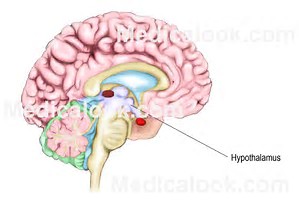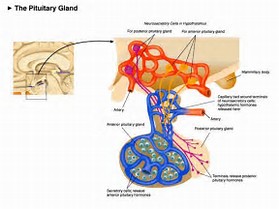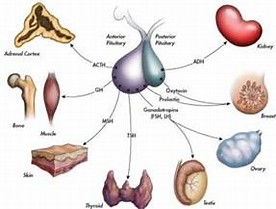Most people have experienced the dry mouth or slight twinge of a headache that usually signals the need for fresh water, but few people are aware of the actual process that takes us to the point of dehydration. It all starts with the hypothalamus, the gland responsible for a number of functions, including:
~ Hormone production.
~ Body temperature regulation.
~ Constant evaluation and maintenance of the human body's fluid balance.

All three of these functions play roles in the process of keeping the body hydrated. When the hypothalamus detects too little water in the blood, it signals to the pituitary gland to release an anti-diuretic hormone (ADH).


The ADH signals the kidneys to minimize their process of removing water from the blood while returning as much fluid as possible into the bloodstream. Once the kidneys pump the brakes on water extraction and instead focus on returning water content to the blood, the need to urine lessens and urine becomes more concentrated, thus the darker yellow hue that is a common indicator of dehydration. Once this process has reached a point where the blood volume is adversely affected, the brain signals thirst, and you feel the urge to drink water. Note that the first thirst signal was triggered when the body is already 2 percent dehydrated. If the process is prolonged, when you do not drink any fresh water right away, the percentage of water in the blood drops, leading to a reduced blood volume, this in turn leads to a drop in blood pressure and an increase in heart rate, both of which are detrimental to all of the cells, as well as the organs and systems throughout the human body.
As the process of becoming dehydrated continues to pile stress on the cardiovascular system, the supply and delivery to the brain is reduced, resulting in headaches, fatigue, inability to concentrate, sleepy, and fluctuations in mood. Once enough fresh water is consumed, though, the body is able to replenish the blood, cells, organs, and systems with the hydration they require, the human body can function as intended again.
~ Hormone production.
~ Body temperature regulation.
~ Constant evaluation and maintenance of the human body's fluid balance.
All three of these functions play roles in the process of keeping the body hydrated. When the hypothalamus detects too little water in the blood, it signals to the pituitary gland to release an anti-diuretic hormone (ADH).
The ADH signals the kidneys to minimize their process of removing water from the blood while returning as much fluid as possible into the bloodstream. Once the kidneys pump the brakes on water extraction and instead focus on returning water content to the blood, the need to urine lessens and urine becomes more concentrated, thus the darker yellow hue that is a common indicator of dehydration. Once this process has reached a point where the blood volume is adversely affected, the brain signals thirst, and you feel the urge to drink water. Note that the first thirst signal was triggered when the body is already 2 percent dehydrated. If the process is prolonged, when you do not drink any fresh water right away, the percentage of water in the blood drops, leading to a reduced blood volume, this in turn leads to a drop in blood pressure and an increase in heart rate, both of which are detrimental to all of the cells, as well as the organs and systems throughout the human body.
As the process of becoming dehydrated continues to pile stress on the cardiovascular system, the supply and delivery to the brain is reduced, resulting in headaches, fatigue, inability to concentrate, sleepy, and fluctuations in mood. Once enough fresh water is consumed, though, the body is able to replenish the blood, cells, organs, and systems with the hydration they require, the human body can function as intended again.
No comments:
Post a Comment